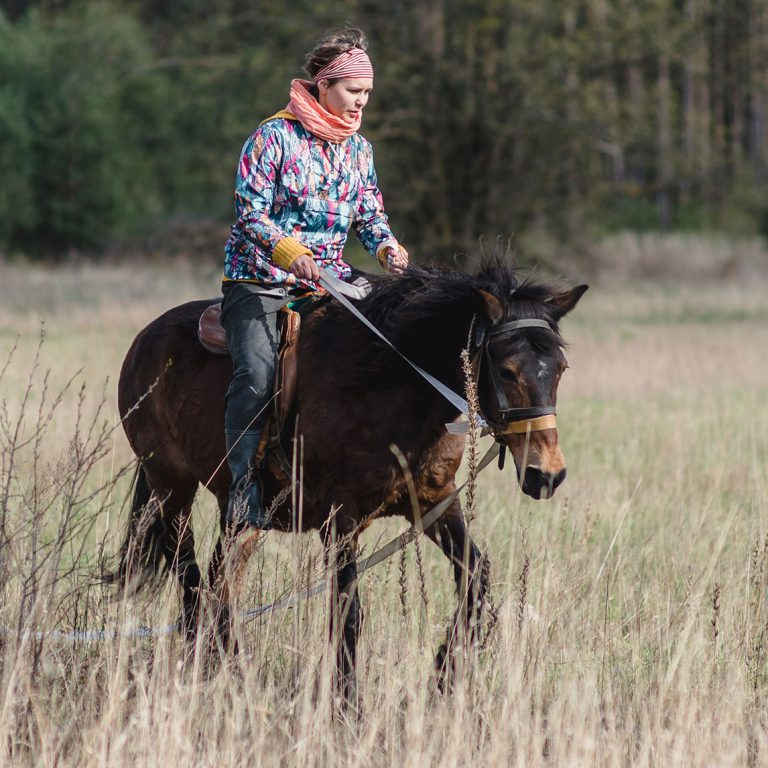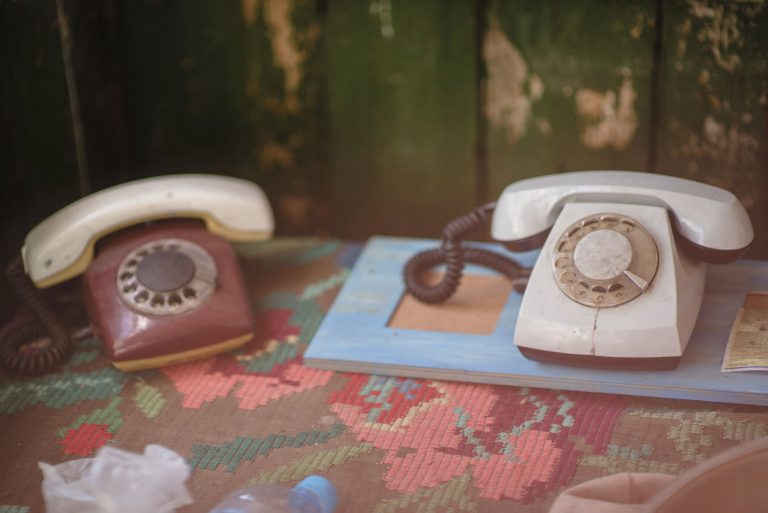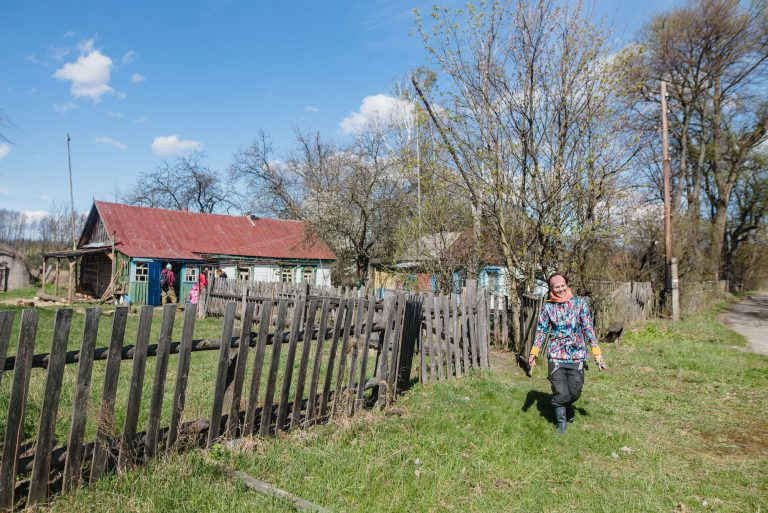She dreamed of having her own artist’s hamlet and holding festivals, film screenings and various art projects with her friends there. She spent a year looking for a village with minimal population. Now that she has found it, she’s constantly fighting the local “laws” and searching for the kind of people who would inspire her.
Kateryna Mizina, a journalist from Kyiv, has owned a house in the hamlet of Zelenyi Hai for the last two years, 120 km away from the capital. She’s planning to gradually transform it into an art space. The locals call it Hoich. According to them, it means a forest clearing. This is a story about dreams, obstacles and earth. The earth that gives you strength and a garden. About pristine forests and an atmosphere that can inspire hundreds of people, about a great faith in people and disappointment, about Podillia and Polissia, about black soil and the sands.
Kateryna Mizina spent about a year looking for the place that she dreamed of. She just grabbed a bicycle and rode it purposefully to this region. She would ride around small villages and mark the smallest of them on the map, those which stood almost empty according to the latest census. Zelenyi Hai was discovered by Katia’s friends:
“Then I came here and I liked this place. At first, no one wanted to sell me a house. I found everyone — inheritors, grandchildren. Everyone refused. ‘No, we won’t sell you anything’. The village head turn away from me, ‘I know nothing’. So I rode off. A year later I came to the neighbouring region, then here again. They remembered me and started to tell me how the houses there got robbed. How no one lives there anymore it, the houses going to ruin. They said there was a fire and no one to extinguish it. By the time they got here from the village to put the fire out with a tractor, the fire had almost reached the other houses. Imagine the hassle. If only someone would live here. This was the context. And I thought, ‘Oh! This must be my chance.’ So I started again. Four months later, I bought a house.”

Katia’s decision to move from Kyiv to the hamlet confuses the locals so much that they’ve started to come up with their own explanations:
“They just can’t get it into their heads. I’m 25, I’m a journalist, I feel fine, I live in Kyiv and earn an income. And I come here and buy a house. Why do I need this? Because they can’t understand this, they don’t want to support it. If you don’t understand, it feels foreign to you, and you begin to imagine reasons of your own. They think, ‘What could make me act like this?’ And they start to think that I’m doing this because I want to earn money from it, scam every one, rob them or something.”
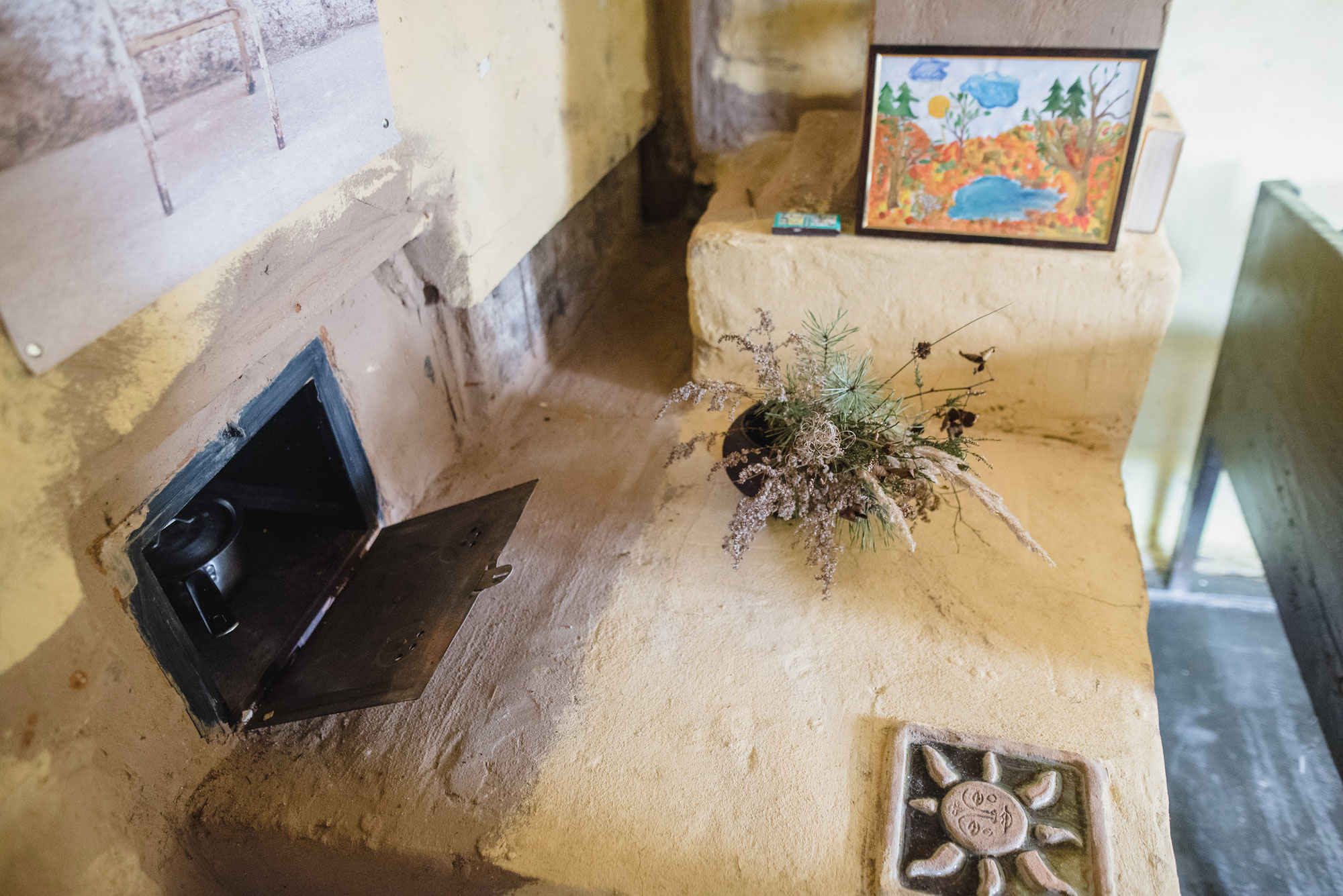
Now Katia takes care of two small houses. Grandmother Eva lived in one them previously. Back when the girl came to Hoich for the first time, she spoke with her. At the time, Grandmother Eva and “Gypsy” Pavlo were living there. It was Eva who told Katia and her friends about the village and its people, and Pavlo took them on an excursion around the area. Later on, her two daughters, Halyna and Liudmyla, took Grandmother to Malyn with them, and Katia offered to buy their house. It took two months of calls and reminders from Katia, but the owners agreed to sell it.
She had one motivation in buying the house — to own something, a place of her own, instead of just buying a flat:
“At some point, I realized that it will take me decades to save up the money for a flat on a journalist’s salary. Somewhere like Kyiv, for example. And I didn’t want to return to my hometown of Kamianets.”
I wanted to have my own place where I could come back anytime.
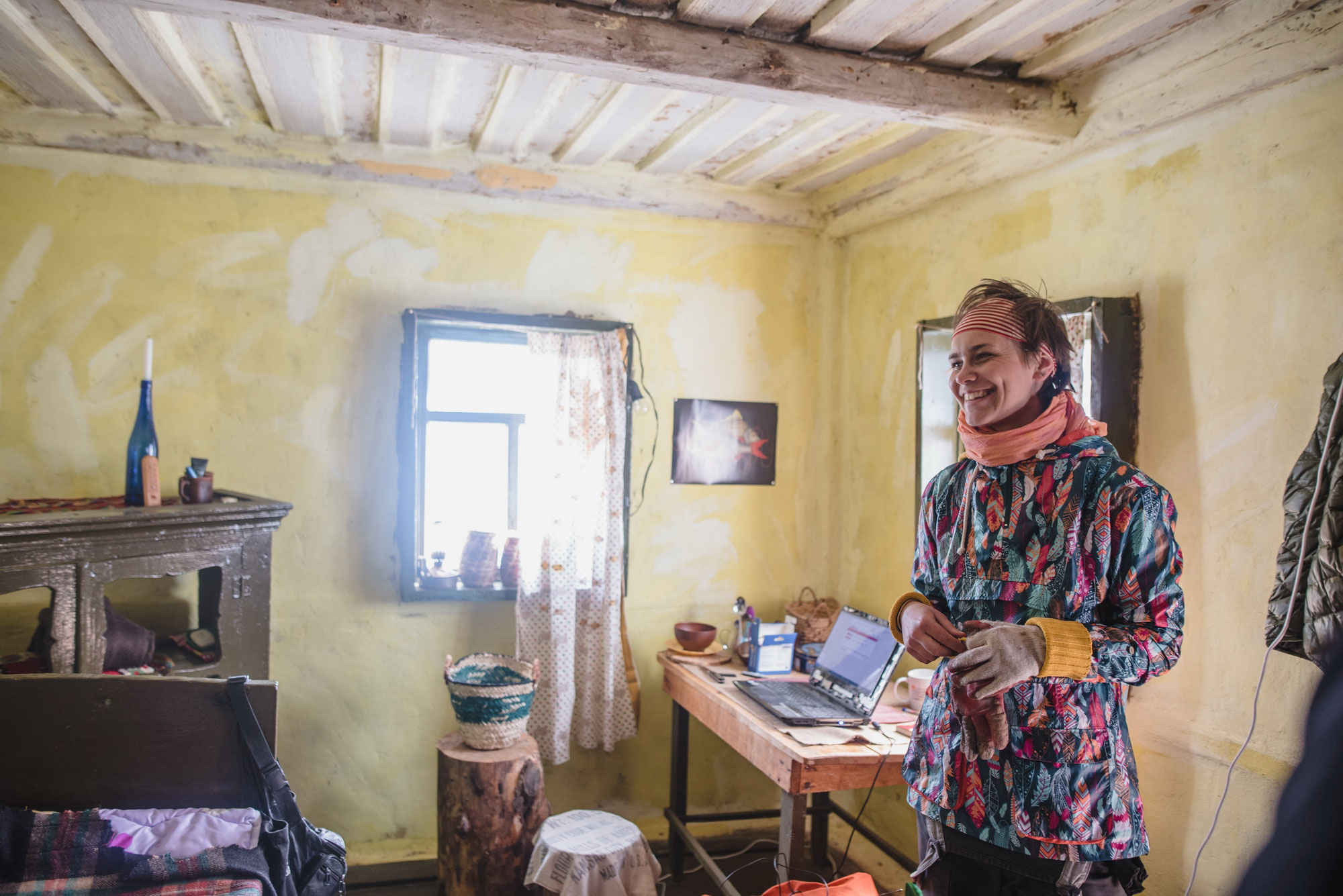
Then I started dreaming about the way this house should look like and what should happen inside. Katia has an interest in creating something instead of living her life out as a consumer:
“I wanted to find the kind of place where I could create something. But I had no desire or plans to build it myself. Every now and then a man gets an enterprising idea to build his own house. I didn’t experience this. I wanted to buy an old house in an old, hardly inhabited village, someplace I could turn into something new. To build something interesting on an old foundation, upgrade it and drum up some activity.”
slideshow
Katia was looking for a place with a low population specifically because she knew that larger villages tend to have an ecology of their own, their own routine, own life, own meanings and principles that they follow, their own relations. It would be extremely difficult to contribute something new to such a village. She wanted to find this fringe, where something was established already, like this once-inhabited hamlet, but nothing went on anymore:
“So that was the thought, to bring a new life to the hamlet. For now, this place doesn’t feel like home to me. But it has become very significant to me, because we develop a close relationship with the things that play a part in our experiences. With people, whenever we go hiking or traveling, we start to feel closer to each other. It’s the same with this place: just like some of our friends, this place can make you very angry very often. Whenever something unpleasant happens here. But it can make you happy at the same time — with its sights, with the people that come together here, the people that I meet here. Thanks to both the good and the bad here, this place has become very dear to me. Not a home yet, but…”
Another distinguishing feature of the Hoich hamlet is the fact that people live here for no less than eighty years. Katia says that she has come here to live for just as long.
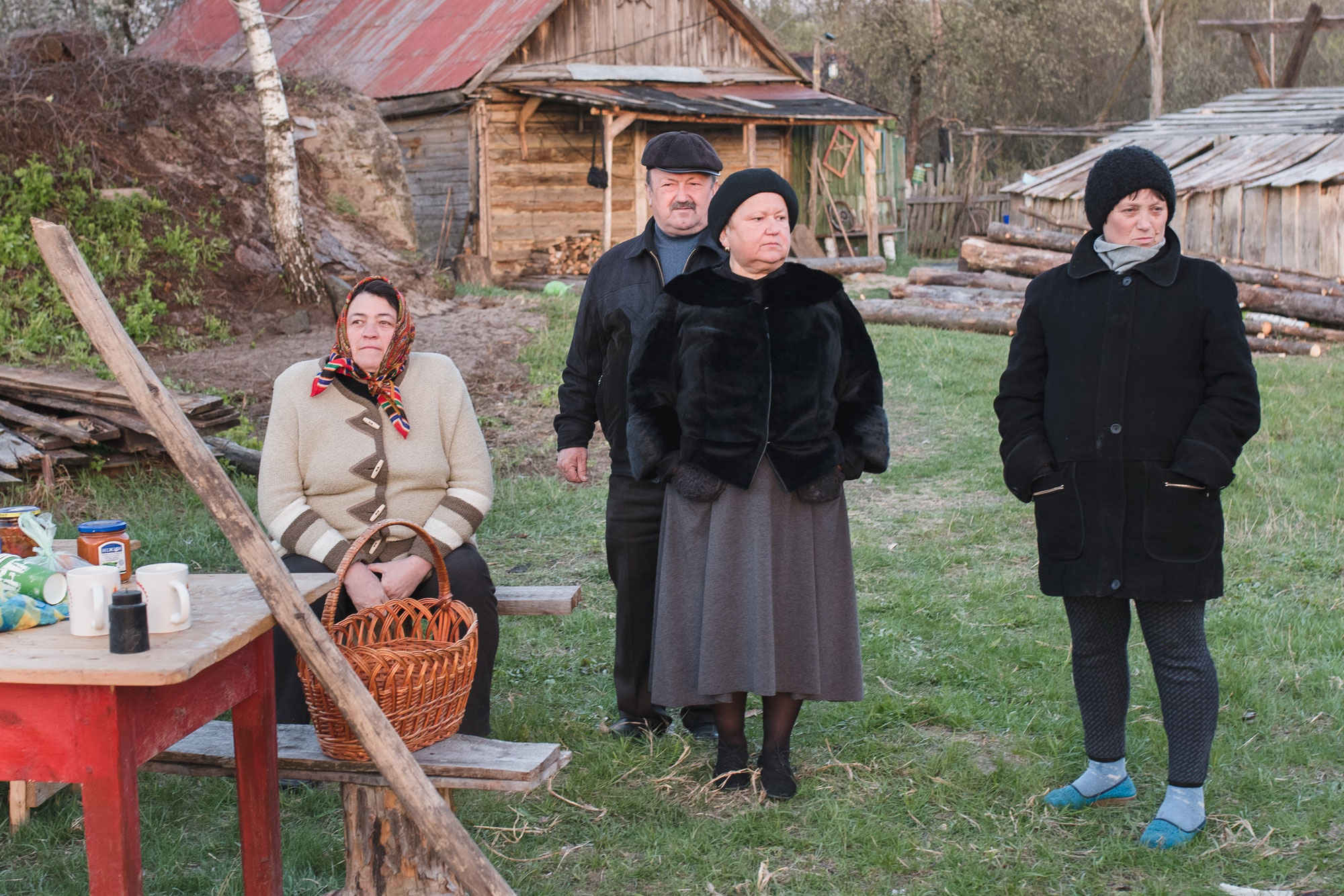
Life on the contrasts
Katia sees more than her fair share of contrasts in the hamlet — both positive and negative. Citing an example, she tells a story of the one day that illustrates this balance:
“I came here and found a note made with dandelions at the entrance: ‘call me’, along with a phone number. How romantic! So I called. ‘Hello, Katia, my name is Natalia. I’m from the village of Nedashky. I’m a poet and I would really like to meet you. I left the letter for you because you weren’t home’. So funny. Really cool. Okay, I’ll come. A man came by to clear the well. Mykhailo Krol was his name. We became friends, but there aren’t a lot of people like me, who think not only about the garden, the money and all that. Only a handful. I lock up the house and go to meet them. Really, this was my meeting with someone who came on their own, just because they wanted to meet me and talk to me. And, at the same time, while I was visiting them, somebody robbed my house. I came back after the visit, after having a coffee, and saw that the backpack with my laptop was missing. That moment, that high point, when I had finally found the people who understand me, who would support me. And then it all comes crashing down.”
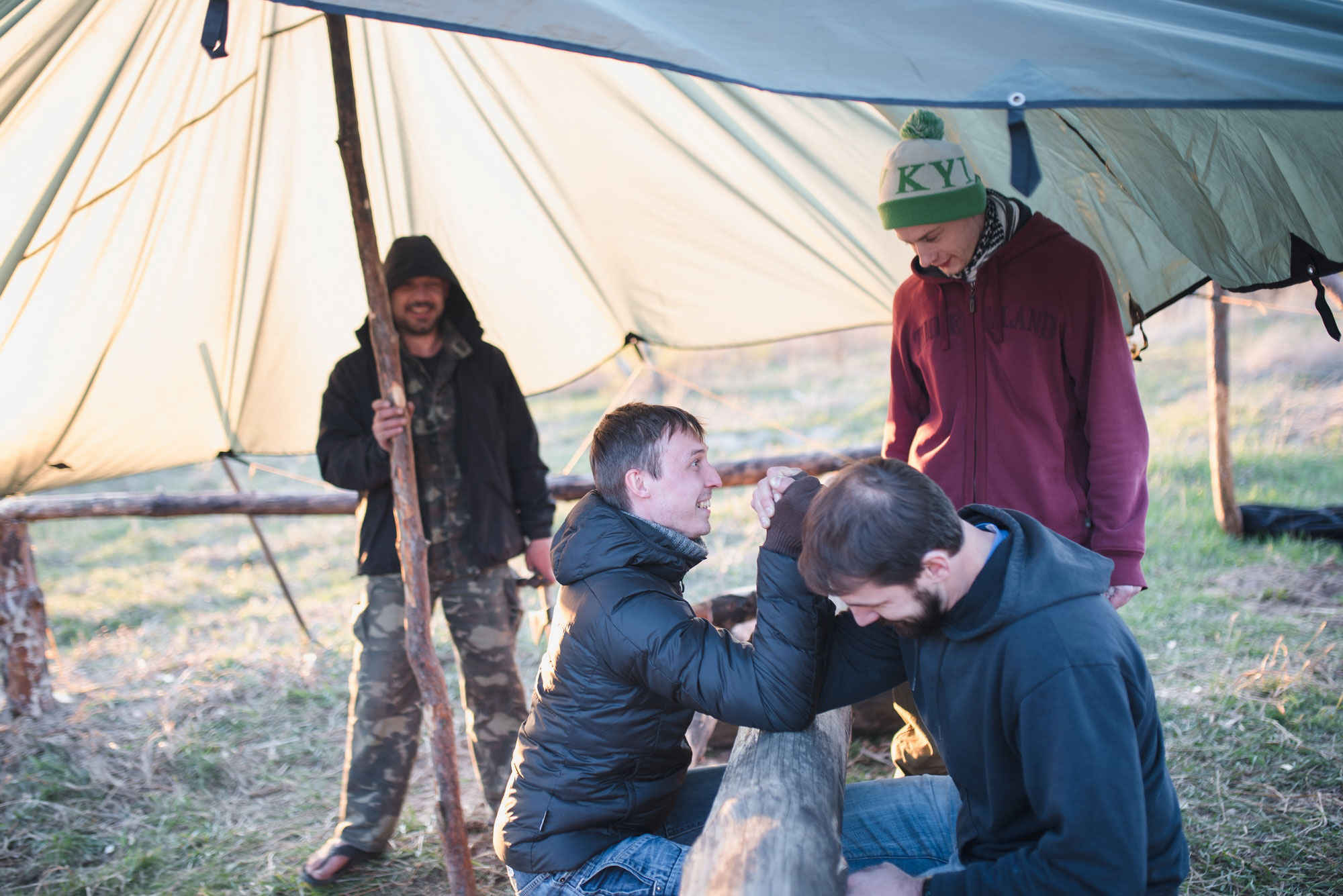
It was very hard for Katia to find a common language with the locals. She says that the people of Podillia are completely different, but she runs into difficulties in the Zhytomyr region:
“Maybe it’s because I wanted to settle down here and started getting deeper into their lives, but everyone’s gone and got some strange preconceptions! They make up some strange legends about me! One guy said, ‘she’s a monster! She wants to kill me, so I won’t sell the house to her friends’. He refused to sell a house to my friends offer because he thought that I was a threat to him. Because of all these bad experiences that I’ve had here, I wanted to give everything up and leave, go find another place or travel — I could always find another place later.”
Local businessman Ivan
There are only eleven houses at the Hoich hamlet. According to the locals, it used to be thirty. Some of them were dismantled, some were moved to Nedashky, some fell apart. There are even some places where it’s obvious that there used to be houses there. But all of the buildings are empty. No one lives there, even though they look perfectly normal. Nver-the-less, Katia and her friends can’t buy them. It turned out that some of them were already sold to a local businessman. Katia has her own theory as to why he’s been doing this:
“When I came here two years ago, nobody was interested in these houses at all. Everything was falling apart. Everything was overgrown. And then the locals started to change their minds and stopped selling their houses to us. Later I found out that they were selling houses to someone else. One, two, three. I learned then that there’s a man who comes from here originally but has been living in Kyiv for a long time. He doesn’t have any roots here anymore. He might have some relatives in Nedashky. He started buying the houses to, as he tells me, ‘make a museum here’. But I don’t believe it. He hasn’t done anything here. He’s already bought five houses — everything that was possible to buy here. We can’t buy anything here anymore, because everything’s been sold to him.”
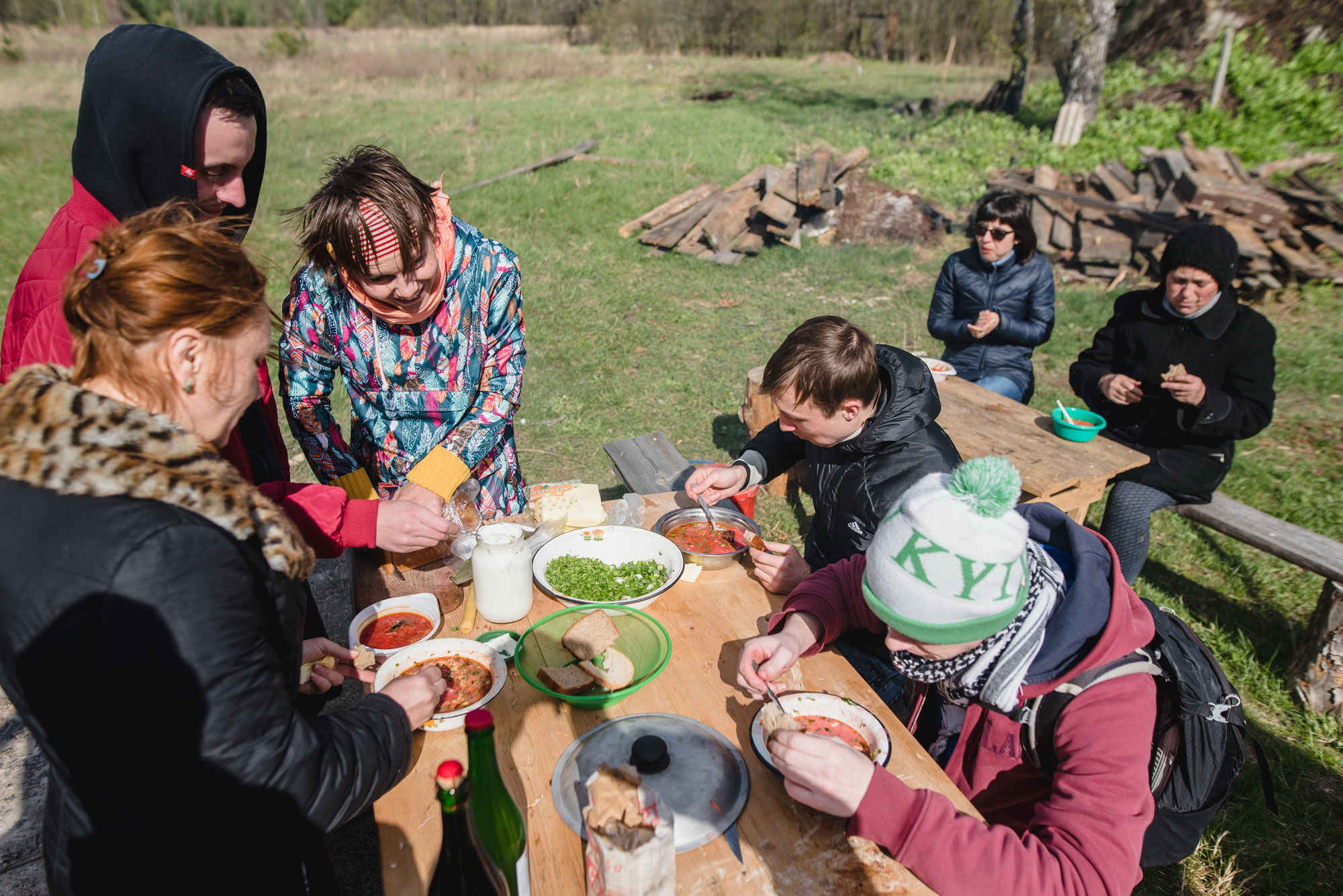
Katia even tried to make contact with a local businessman, Ivan. They met and agreed to work here together— she would help with media and restore the local cultural life. During their meeting, Ivan assured Katia that this place was close to his heart. He was born here and that’s why he wants to make something of it together with his children:
“So I ask, ‘What do you want to do here exactly?’ ‘Well, maybe a museum of some sort, like in Pyrogovo’. I tell him, ‘I don’t want to criticize you, but who will come to your museum? It’s very far. Pyrogovo exists already.’ ‘I’ll find the visitors!’ And before that, I organized an event for everyone to plant trees. Fifty or so people came. Just to have a dig around. He knew about it — he saw it in the newspaper, so he started talking about that. I said to him, ‘Look. I can get people together. I’m a journalist, I have a different toolset, I can help you to make this place more popular, to draw some real media attention, some guests.’ ‘Yes, maybe it would be interesting for us to work together’. And I thought: finally! He has money. He can buy all the houses, and we’ll make something of it as a team. So I said to him, ‘Okay. Just don’t buy any of the remaining houses. For me to stay there, to manage this place, to protect it and take care of it, I need others to live here too. I need some neighbors, because I live there all by myself, and I won’t enjoy developing all of this as a museum for just the one person’. ‘Yes-yes, let’s sit down together with a plan of the village and try to imagine what we’ll build and where. Let’s plan the territory’. And I was like, ‘Cool! Let’s do it!’. We agreed to talk over the phone a week later. I came here the following week with a friend of mine who brought along a down payment for one of those green houses. The woman didn’t come and wouldn’t answer my calls. Some local came by and I asked, ‘Do you know where the house owner, Lisa, is,? She said she would come. We brought her the down payment’. ‘Oh, but she sold the house to Ivan last weekend’.
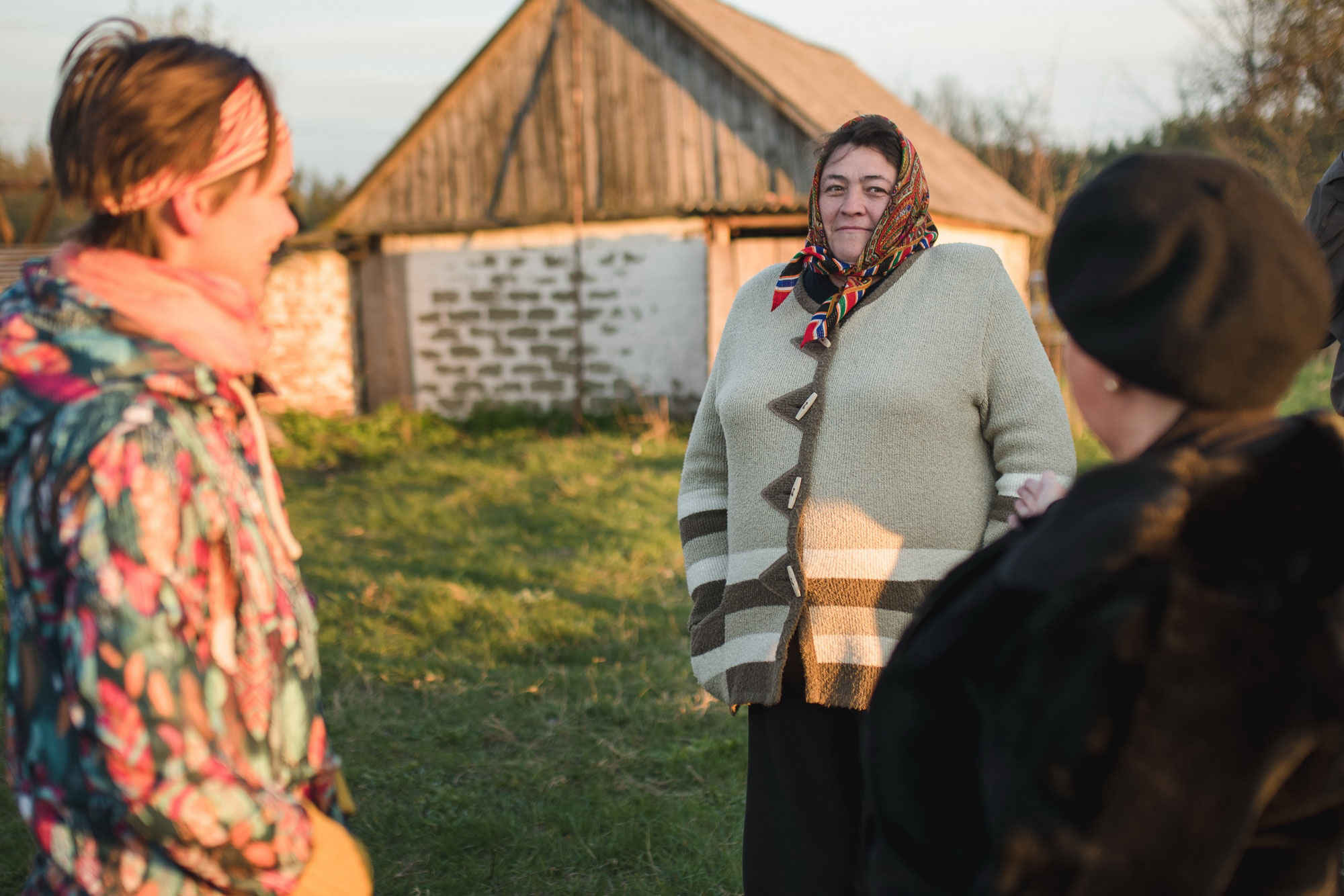
From time to time, relatives of the people who used to live here come visiting. We met some of them during our excursion. A lot of people have heard about Katia. They greet her and tell her stories about how there used to be a lot of mushrooms here, a pond, enough berries in the forest to have your fill and that there was a lake once too. They show her pictures, recall their childhoods and the feelings this place used evoke. Katia dreams that someday you’ll be able to go for a swim at Hoich again. The locals also understand that the businessman won’t do anything here but refuse to sell to Katia regardless.
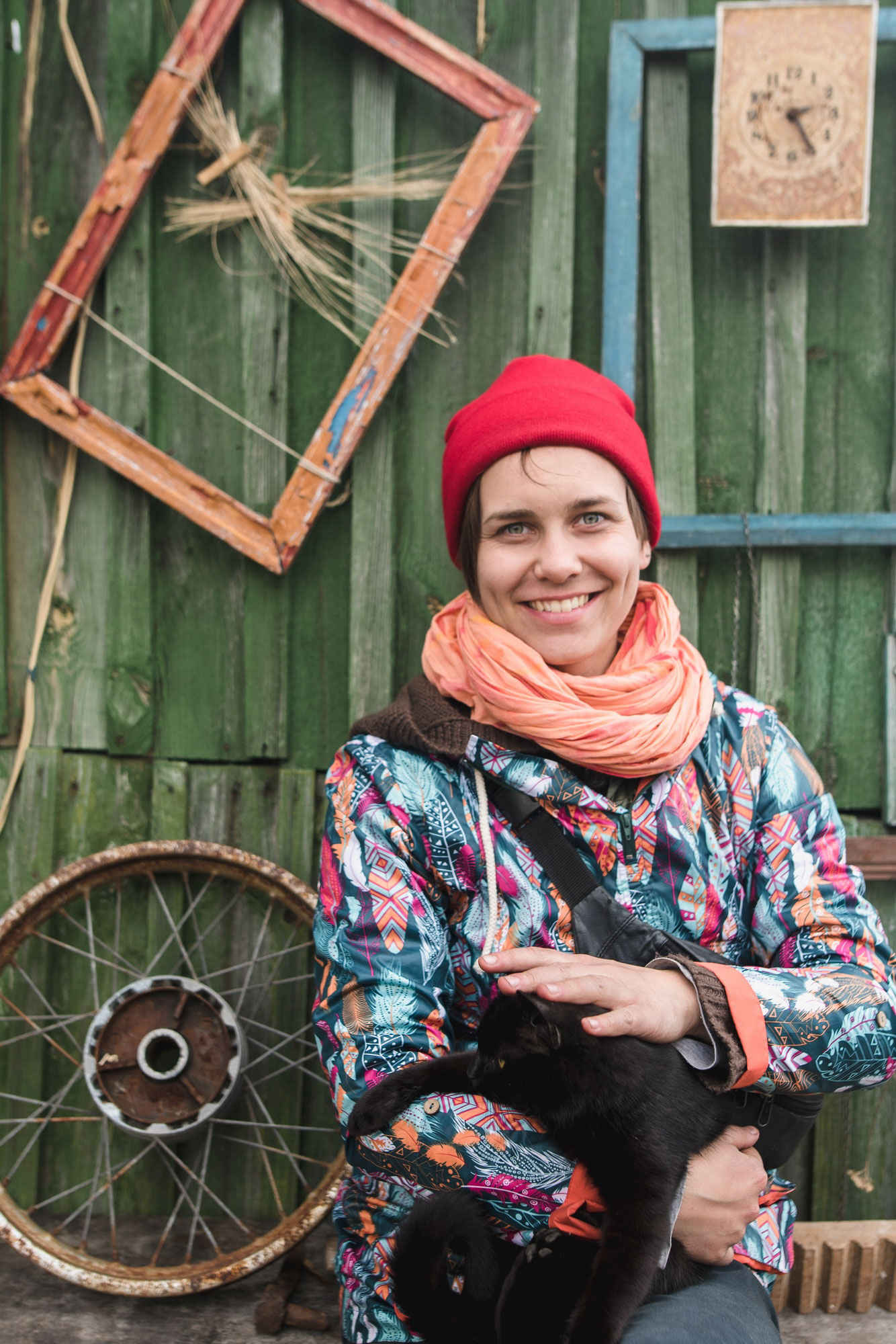
Katia thinks that people are too afraid of everything here. At first, they used to say that Katia and her friends were refugees, drawing a connection to the ongoing war. Most of them are too afraid to even approach and say hello to Katia. Instead, she keeps hearing new stories about herself. Some people say that she will resell the houses here. Some are afraid to even bring firewood.
Local “engines” for Katia
There are, however, people in the hamlet and the nearby villages that act akin to engines and motivators for Katia. 15-years-old Nadia, who teaches visitors to Hoich horse riding and plays the bandura; a fan of BBC, Ivan; a schoolteacher from Kyiv, Liudmyla, who confessed love to Katia at a bus stop; 90-years-old grandmother, Malvina, who is teaching Katia housekeeping while trying to find a husband for her. They’ve all accepted this stranger girl and try to change the way others view her.
Nadia and Ivan
“Nadia lives in the Nedashky village. Last time I came here to organise an event — we planned a movie screening, heaps of people came, and I went to Nedashky to find someone who could bring us horses. I found out immediately that a lot of people from Nedashky keep horses and I thought that it would be a cool event for the visitors, for the guests. I went to find somebody who could bring horses and found Nadia’s father, Ivan.”
Nadia’s father brought a horse and Nadia came with him. That day, all the guests really liked her, and, later, she’d even call Katia and invite her to her birthday:
“And her dad — he’s hilarious. We watched ‘Virunga’, a film that received an Oscar in 2012 for the best documentary film. It’s about a national resort in Kongo, where Americans came and wanted to build an oil refinery or something. There was a conflict between the locals who looked after gorillas in the national park and those Americans. And Ivan, Nadiia’s dad, watched the movie just like this! He was standing the entire time. I said to him, ‘Why not sit down?’ ‘No’, he says. ‘I’ll stand’. Anyway, he watched the whole movie standing, all two hours long. Then, he comes up to me and says, ‘Katia, what a movie that was! Incredible!’ I say, ‘Great, I’m happy that you’ve enjoyed it’. ‘I love watching things like this! Whenever we watch TV, I’ll always switch whatever’s showing on the VVS channel [BBC in Cyrillic script is equivalent to VVS in Latin script]. Everyone around me says, “What have you turned on this time?” But I love it so much!’ And I keep silent and think to myself, ‘What is VVS? Is it some sort of military or army maybe?’ Then it strikes me — it’s BBC! He likes to watch BBC! Oh, God, Uncle Vania! Fine, I’ll bring you more movies like this!”
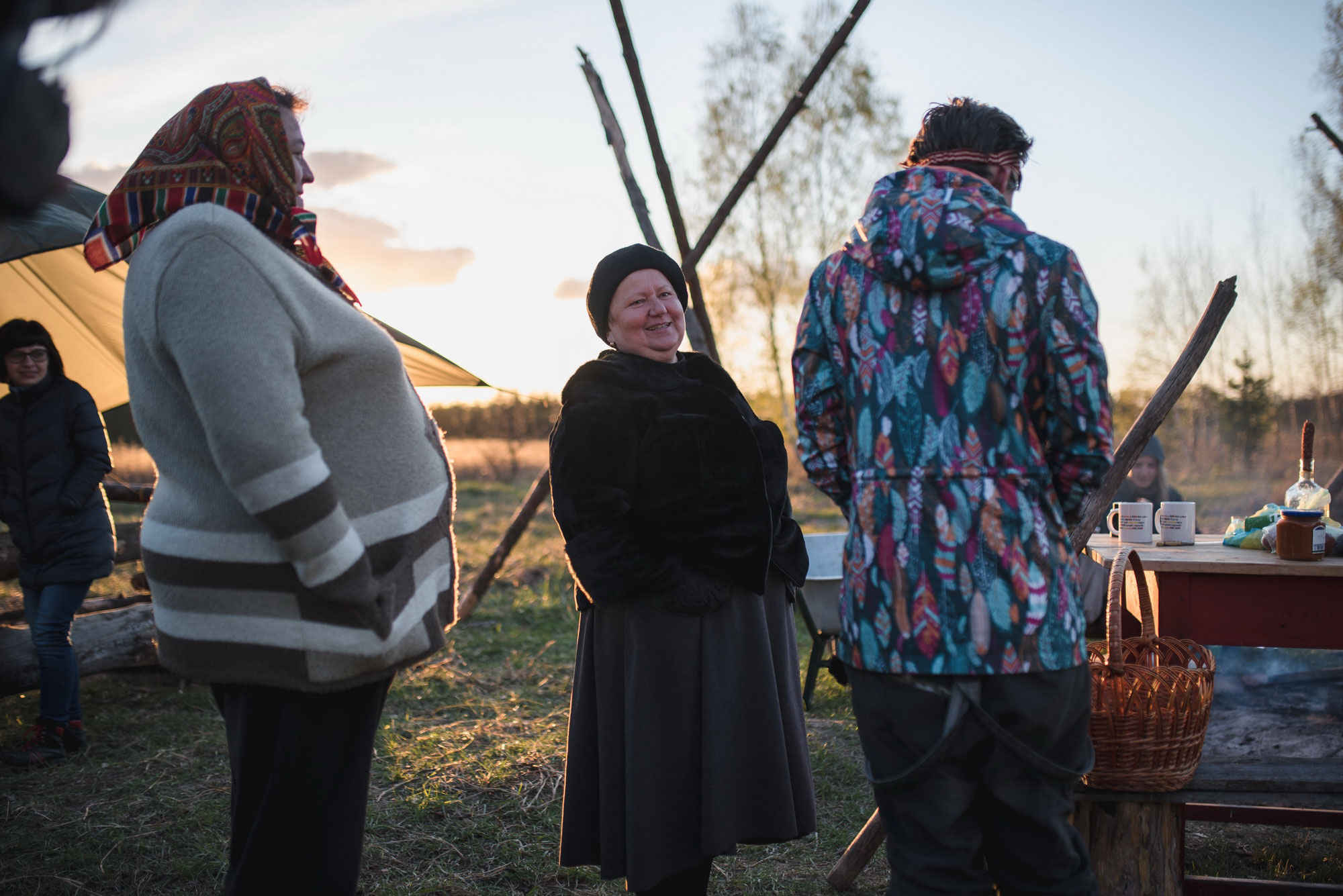
Liudmyla
Katia met Liudmyla, a teacher, at a bus stop in Nedashky while waiting for her bus:
“I was standing there, feeding a dog some muffins. I’ve got headphones playing music over one ear, and I’m listening out for the bus with the other, because I’m not looking at the road. And a woman was standing nearby. I didn’t pay much attention to her until she came closer, when the bus arrived. ‘Are you Katia?’ ‘Yes’. ‘I love you so much!’ I just nodded, I’ve got my headphones on. I get on the bus. Thinking maybe I misheard her. I had music playing in my headphones, so maybe I heard ‘I Love you’ in a song or something. Why would a stranger like this woman come up to me at a bus stop and say ‘I love you so much!’. And this in Nedashky, where everyone hates me. So I turned around, thinking to ask her if I had heard her right. And she’d already seemed to fall asleep on the bus. I made a post about this which got a lot of likes. Next time I took the same bus, I met someone who happened to be a friend of hers. We had a chat.
“And, a couple of hours later, they came to visit me. ‘I’m the same Liudmyla who told you she loves you so much — you heard it right. I follow you on Facebook’. Such a bright person, with such kindness and warmth, came to visit me!”
Liudmyla lives in Kyiv. She comes here to visit her mother. She promised she would help Katia with everything — she would be her “bulldozer.”
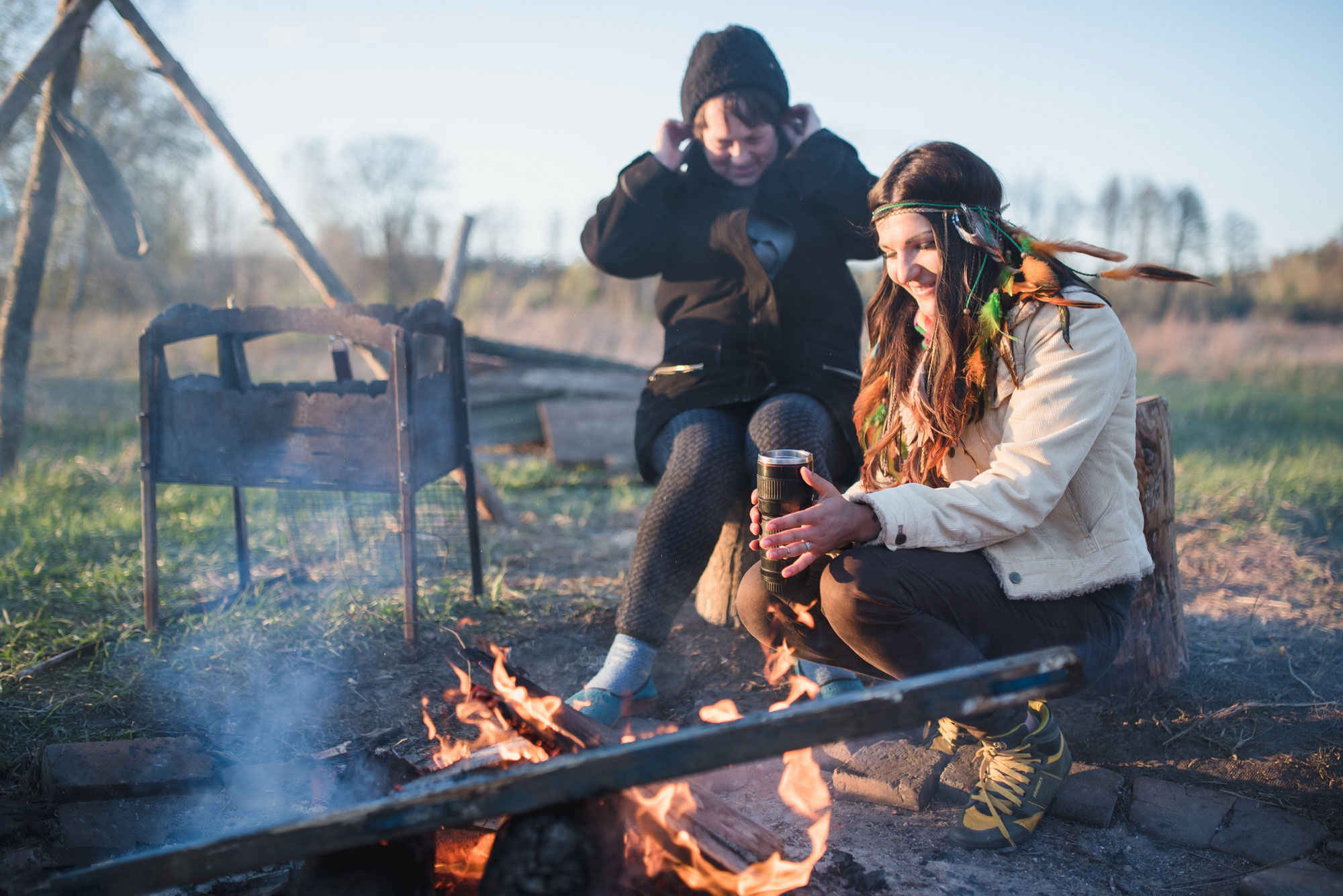
Granny Malvina
In the warmer seasons, Katia receives another neighbor — the ninety-years-old granny Malvina. She is the one who teaches the girl how to keep a household and says that the time has come to find a man to marry:
“Once I came here with a guy. I don’t remember for sure but I guess his name was Ihor. He wanted to look at the houses for sale here. And I’m like, ‘I can show you if you want’. We hadn’t met before, but I’m always happy to show off this place and share it with others. We arrived here and dropped by granny Malvina’s. She wasn’t across the details of who he was. So she says, ‘Oh, Ihor, nice to meet you.’ And, of course, she’s already overthought it. He had a look around for a couple of days and left. I stayed here, and Dima Kupriyan came to visit me. He was cutting the grass in front of the house. Grandma Malvina comes and says, ‘Oh, hello’. Then she approaches me and asks, ‘That’s Ihor, right?’ And I say, ‘No, that’s Dima’. ‘And where’s Ihor?’ And I say, ‘Ihor left. He’d just came to look at the houses’. ‘Ah, okay’. So she went to talk to Dima. ‘Dima, like this, try to cut it like this.’ Then comes to me and says ‘Dima’s a nice guy. Hang onto him’. ‘Okay, sure. Thank you, granny’. She left, and, an hour later, Sasha Kviatkovskiy arrived. He’s behind the house somewhere, hanging a hammock or something. The granny’s like, ‘Hello, Dima!’ He comes around, and she’s like ‘Hello, and who are you?’ And he says, ‘I’m Sasha’. She goes ‘Katia, and who’s this one?’ Leaves. Comes back in an hour and sees Ruslan, who’s helping me tear down the shed. And she’s like, ‘Hello, Sasha!’ And he’s like, ‘I’m not Sasha’. ‘And where’s Sasha? Are you Dima?’ ‘No, I’m not Dima, I’m Ruslan’. Then she came to me and said, ‘So Dima is the best option, take Dima. He was cutting the grass so well’. After that people started gossiping that ‘there are lots of men coming to her all the time’.
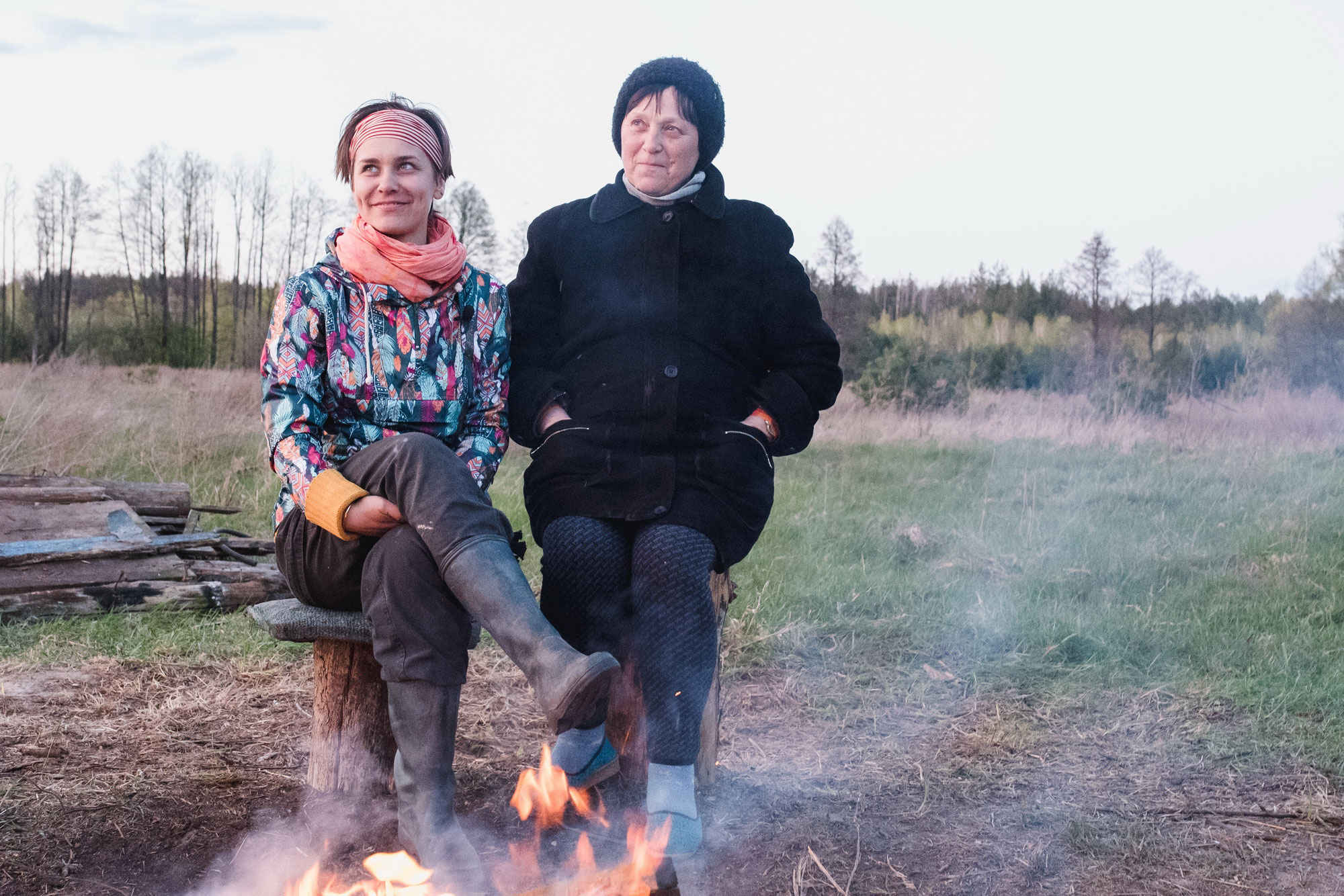
Katia’s mom
Katia’s mother was born and grew up in the village. When she was fourteen, she ran away to continue her studies at a school in the city. With time, she enrolled at a university in Moscow. She always had a strong desire to leave the village:
“When I told her, having finished my studies as a television presenter in Kyiv, that I want to buy a house in the village, to make a kind of … I couldn’t pick the right words to explain what I wanted to make. I thought that it would be better if I’d just show her, if I’d make it. I was living in Obyrok*, and she would come to visit me there. She saw up close that it’s not just an ordinary village life, it’s something different. I remember I told her once, ‘Mom, I bought a house in the village’ and she was like … there was nothing but silence over the phone. She was in shock.”
Obyrok
Obyrok is an art village founded in 2007 on the site of an abandoned village in the Chernihiv region. Nowadays, it hosts various festivals and art events.Despite that Katia has two houses in a village near Kamianets, grandmothers, and everyone knows her there, she doesn’t want to go back there. She doesn’t want to create something in comfort:
“I’m interested in setting myself tasks, challenges. That’s why I didn’t want to go back to a place where I have a flat, where my mother and others would be waiting for me. I went to the Zhytomyr region specifically because I knew nothing about that oblast, about that region, about the districts, about the places, about the zones, about Chernobyl. It was something new and fascinating for me. The newer less known a place, the more interest I had in it.”
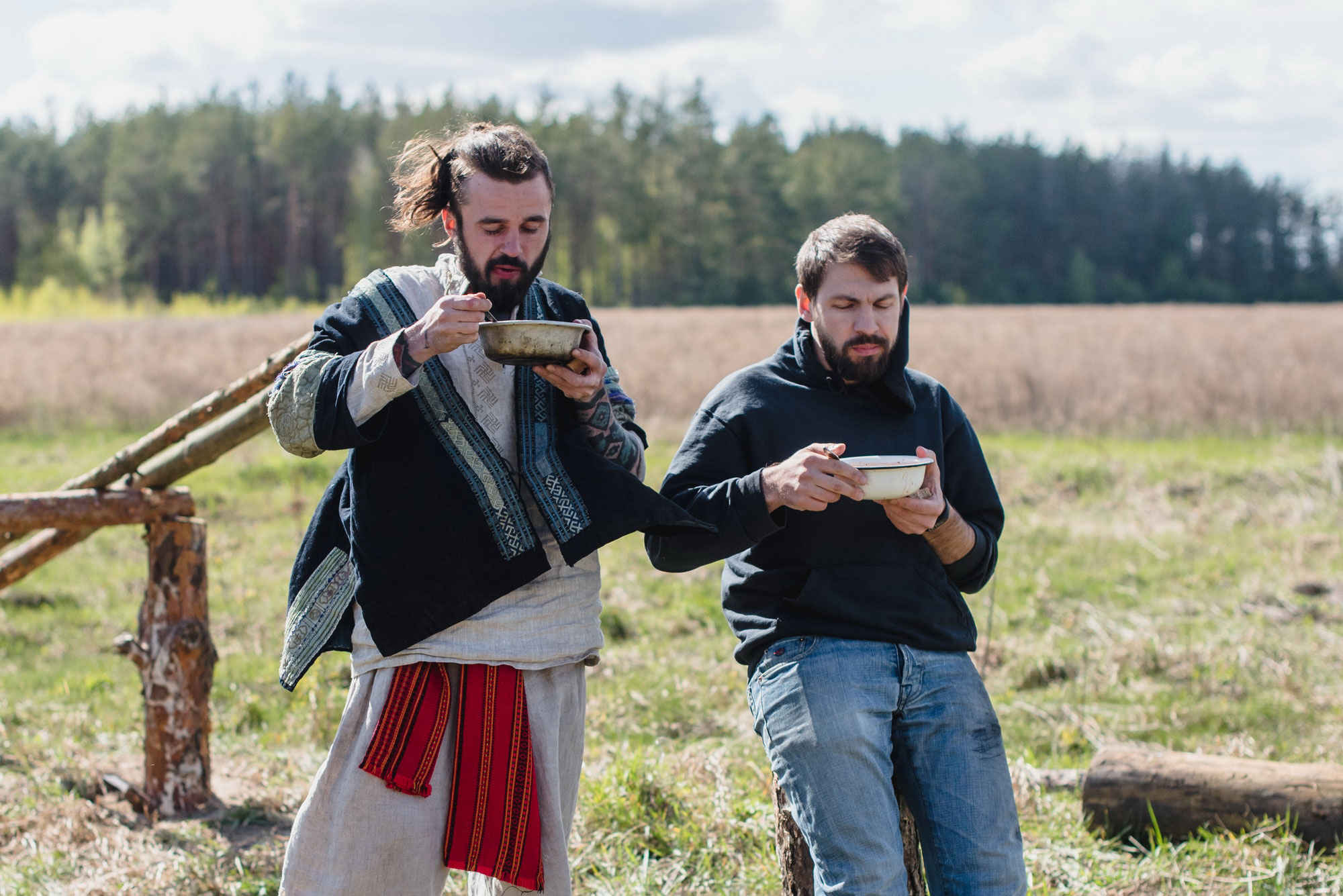
Katia’s mom came to the village for the first time a year ago during winter. She said that as soon as she saw the area, she “felt her heart ache”:
“Mother of God! We have don’t have houses like these. Even our barn is better than this house. We tend to build houses differently, our villages are richer. Nature is different. All of this struck me as odd. And when you come in, you’ll see that everything is black, just like my jacket. Oh, God. Whenever she goes to the village at this time of the year, I can’t sleep half the night. I keep thinking about how she’s doing there on her own. There’s only the forest, the wolves and Katia.”
The woman struggles with the thought that everyone is leaving the villages these days, while her daughter is doing just the opposite:
“I kept thinking to myself: ‘Oh, God, Katia! Others are breaking out of the villages. They’ve gone to the cities. There’s culture there, you can take a bath… Why are you going to this swamp?’ Then I came here and I didn’t find a swamp. There’s sand here, a beach. And it rains, and you’re keeping clean. She likes all of this, so what can I do about it?
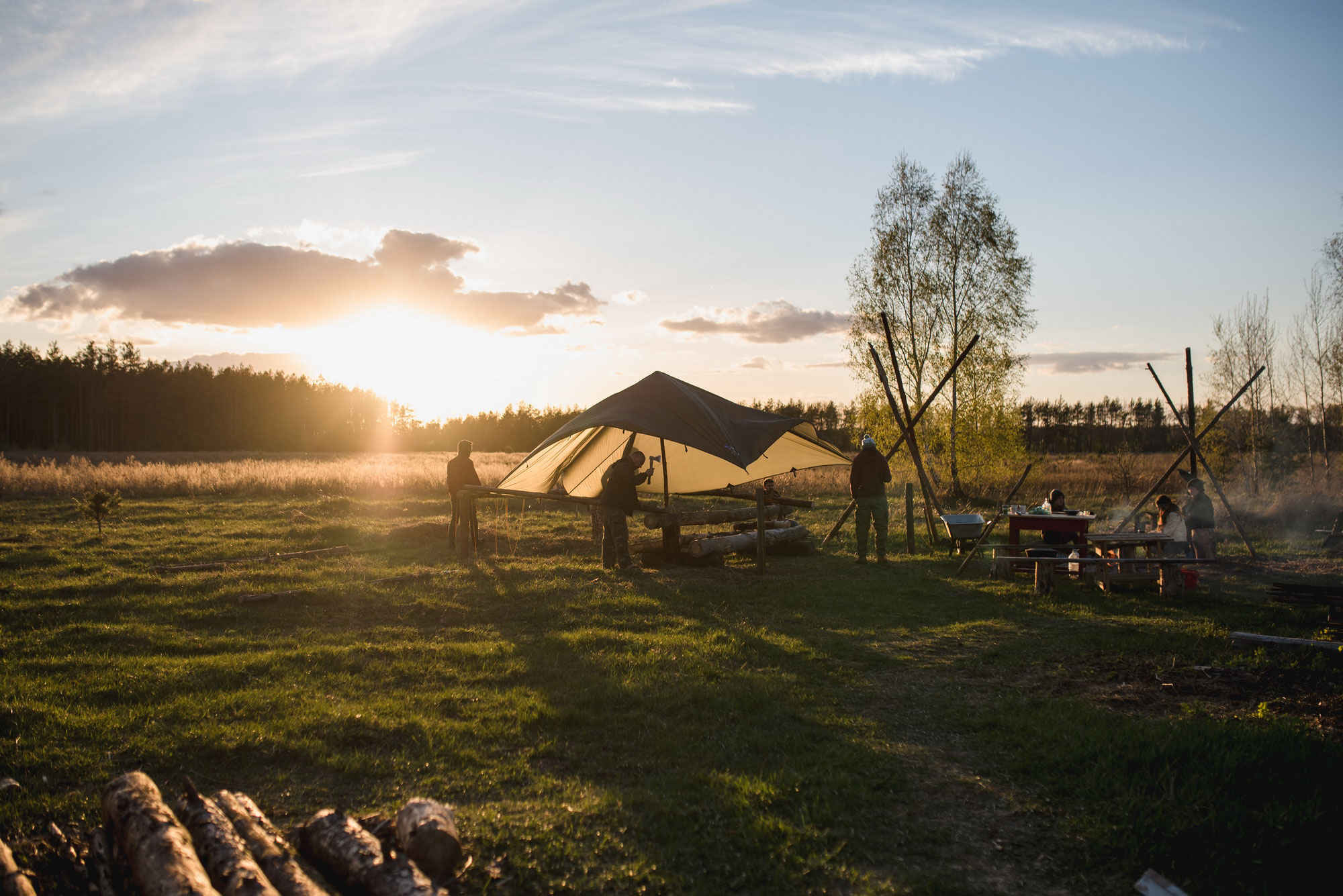
Radiation of changes
Katia had plans for the entire village. She used to imagine in terms of the area of the settlement, but now that she has only got her house, she is trying to curb her ambitions. Katia plans to organise various events together with the locals, to reach out to them. She wants to simply bring people together — not just villagers and locals, but people from Kyiv, too. She has already made peace with the fact that it will be more of an art residence, not an art village:
“I want to reconstruct the house, I want to build a sauna. So that the people coming here will have a place to wash. I want to make a workspace where you can create and make something with your own hands. So, maybe, there would be some weekends when people could get together and create something. It’s just a good opportunity to meet up, because people don’t often have a place to meet, to talk, to work, to dig, to polish a plank. Work therapy is truly a magical thing. I myself never liked to work in the village, not until I made the right conditions for it to be enjoyable and useful. The air here is great, and there are highly beneficial conditions; there’s no internet here, no decent mobile reception—and that’s really cool. It’s connecting people, everyone turns off their phones and starts to talk.”
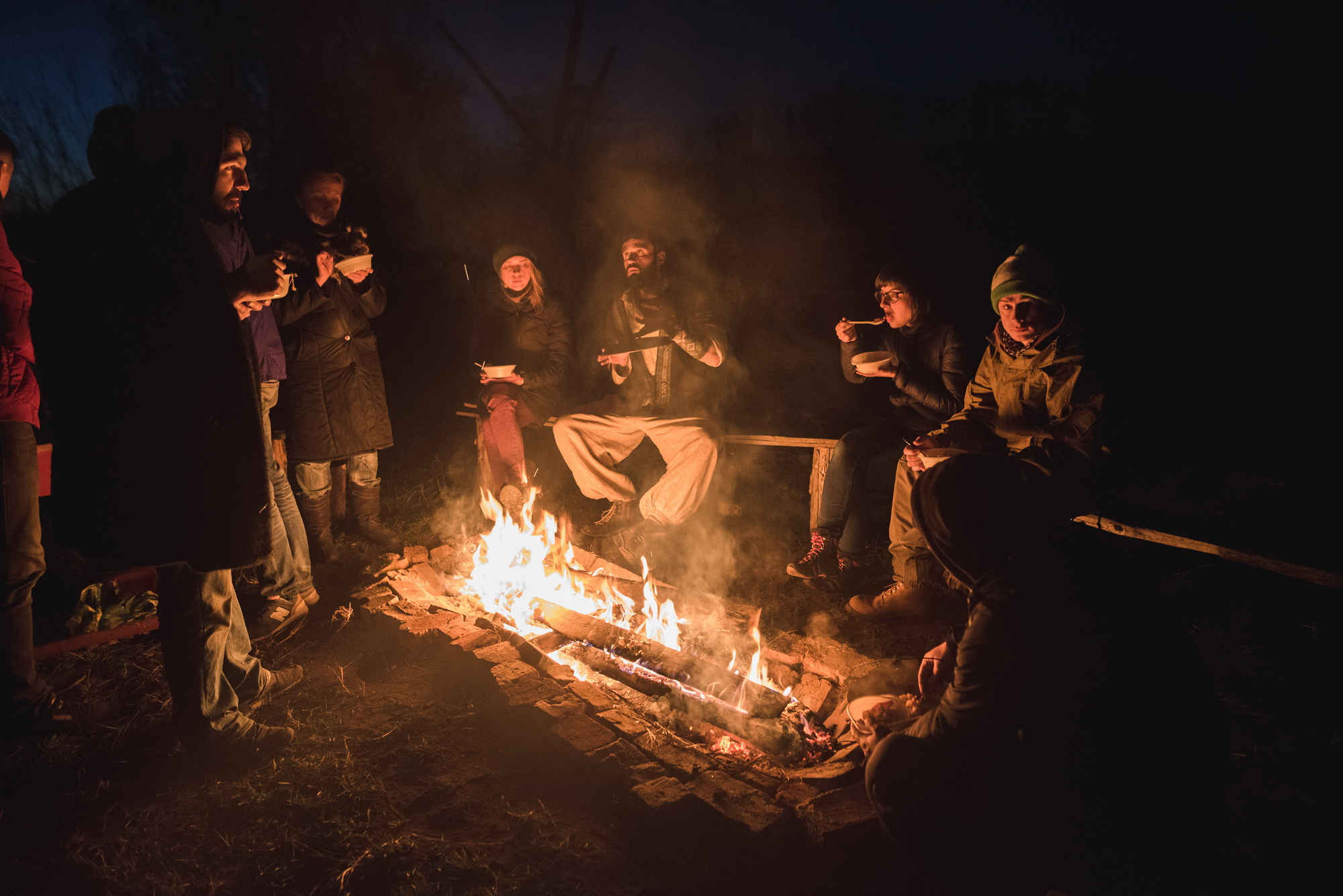
The village taught Katia to accept people as they are, to smile, to always radiate kindness and avoid negative and unkind methods of communication.
“And it works. For real, when he comes to you and like, ‘Look, I don’t want to get into trouble. I brought you some wood’. And I say, ‘Come on, Oleg, what are you on about, what trouble? Everybody has problems in their life; I have some, you have some, too’. I smiled to him, he smiled me back and left. When you smile at the person grumbling at you, it’s a kind of magic and it works. Everybody starts smiling.”
Despite the fact that Katia wants to change this place and the villages around it, she would never accept the position of a village head. She says that she doesn’t feel like she can change anything here yet:
“Even with the fact that I bought a house three kilometers from the village. How can I interfere with them? Everyone in the village has it in for me. If I run for the village head, they’ll pelt me with rotten eggs. I don’t want to say that they’re not ready yet, but it’s not the time to change something in this village. I’d also drop dead in one of their governmental positions here. There’s schemes everywhere: forestry, sawmills, cops, hunters. Everything’s tied together in a knot. This system could swallow me with ease. I wouldn’t achieve any change here. It’s better to try changing something in my little corner, and then I’ll try to slowly spread out this radiation of changes.”
Independence is feeling empowered to accomplish something
Katia says that Ukrainians are very nice people in general. That they are united by some “unseen thing”, despite the fact that everyone is different:
“A common feature of sorts among Ukrainians is hospitality, even if it doesn’t seem like it at first. I felt like people were very inhospitable here at first, but the deeper I dug beneath this surface … Ukrainians aren’t an easy people, but they’re very kind. And it keeps you falling in love with them, with these places that unite them. Their kindness and sincerity.”
For Katia independence is when she doesn’t have to ask for her mother’s permission to travel to Africa, but telling her as much and having her mother’s support instead. She doesn’t want her independence to harm anyone:
“Often people take independence to mean ‘I do whatever I want’. It’s not about that. It’s about having the feeling that you can do something. It’s that level of my self-development, when I can afford to go out and buy something for myself, on materialistic level. To earn some money and spend it. And, on a metaphysical level, walking up to a person and saying, ‘I love you’. Just like Liudmyla did to me. Really, it’s a kind of independence from morality, limitations, labyrinths and frames that society builds for us. You want to simply get rid of them and call it ‘independence’ — just smile at a person and say ‘I love you’.”
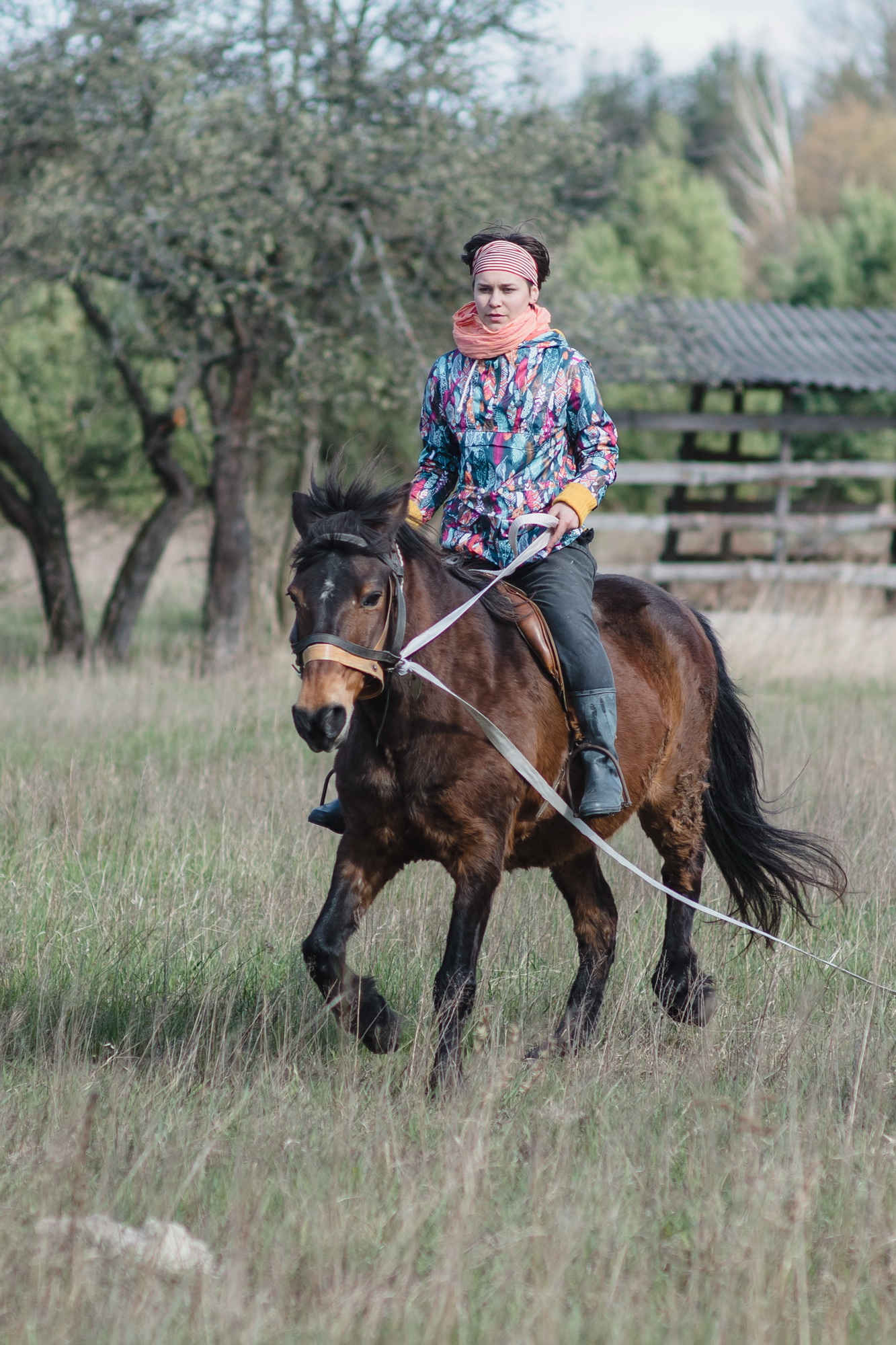
I want there to be gardens here
Life in the village has taught Katia many things, such as planting trees. Katia dreams about her own garden. There are plenty of trees there, but few of them are fruit trees. She got used to the fact that, in Podillia, there are huge gardens at every house. Over there, when people arrive on their land, they first build a house and plant a garden. At Hoich, on the other hand, at her place and her neighbours’, there are maybe two or three apple trees and a pear. Katia wants people to enjoy seeing gardens here in 15-20 years. She found it strange that Polissia has sand almost everywhere, whereas Podillia, where she had grown up, has black soil:
“Really, you drop the seed from a cherry, and it’ll grow. I dropped lots of them here, and it didn’t work. So I went to the village to look for humus. Found this one guy with a horse. He said, ‘Fine, I’ll give you some’. And he brought a huge cart. A cartful of humus cost UAH 400 or UAH 500. It’s a legitimate treasure. Last year, we put it into thirty pits. And fifteen more this year. There’s no end to this humus, too. Otherwise, I might have given up planting by now (laughing).”
In the meantime, apart from the garden, she’s “seeding” rapport, showing what art may look like and how work can unite people. Every time Katia manages to gather countless friends at her place — some come from Belarus, some from France. You can often meet activists planting trees or setting up a tent together, some even want to make a “green couch” in the garden. In any case, if Katia is good at one thing, it is uniting people no matter what. And who knows, maybe businessman Ivan will allow Katia’s dream to come true one day.

